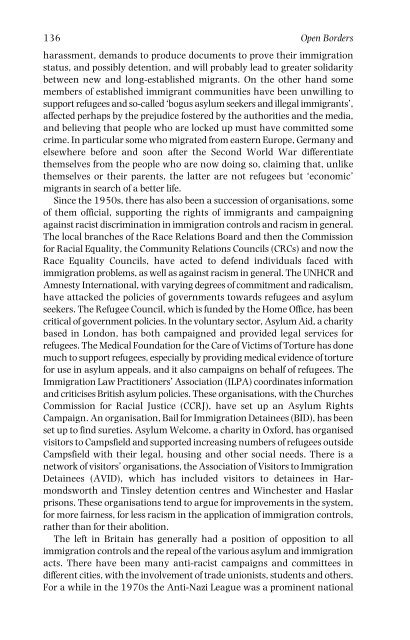Open%20borders%20The%20case%20against%20immigration%20controls%20-%20Teresa%20Hayter
Open%20borders%20The%20case%20against%20immigration%20controls%20-%20Teresa%20Hayter
Open%20borders%20The%20case%20against%20immigration%20controls%20-%20Teresa%20Hayter
Create successful ePaper yourself
Turn your PDF publications into a flip-book with our unique Google optimized e-Paper software.
136 Open Borders<br />
harassment, demands to produce documents to prove their immigration<br />
status, and possibly detention, and will probably lead to greater solidarity<br />
between new and long-established migrants. On the other hand some<br />
members of established immigrant communities have been unwilling to<br />
support refugees and so-called ‘bogus asylum seekers and illegal immigrants’,<br />
affected perhaps by the prejudice fostered by the authorities and the media,<br />
and believing that people who are locked up must have committed some<br />
crime. In particular some who migrated from eastern Europe, Germany and<br />
elsewhere before and soon after the Second World War differentiate<br />
themselves from the people who are now doing so, claiming that, unlike<br />
themselves or their parents, the latter are not refugees but ‘economic’<br />
migrants in search of a better life.<br />
Since the 1950s, there has also been a succession of organisations, some<br />
of them official, supporting the rights of immigrants and campaigning<br />
against racist discrimination in immigration controls and racism in general.<br />
The local branches of the Race Relations Board and then the Commission<br />
for Racial Equality, the Community Relations Councils (CRCs) and now the<br />
Race Equality Councils, have acted to defend individuals faced with<br />
immigration problems, as well as against racism in general. The UNHCR and<br />
Amnesty International, with varying degrees of commitment and radicalism,<br />
have attacked the policies of governments towards refugees and asylum<br />
seekers. The Refugee Council, which is funded by the Home Office, has been<br />
critical of government policies. In the voluntary sector, Asylum Aid, a charity<br />
based in London, has both campaigned and provided legal services for<br />
refugees. The Medical Foundation for the Care of Victims of Torture has done<br />
much to support refugees, especially by providing medical evidence of torture<br />
for use in asylum appeals, and it also campaigns on behalf of refugees. The<br />
Immigration Law Practitioners’ Association (ILPA) coordinates information<br />
and criticises British asylum policies. These organisations, with the Churches<br />
Commission for Racial Justice (CCRJ), have set up an Asylum Rights<br />
Campaign. An organisation, Bail for Immigration Detainees (BID), has been<br />
set up to find sureties. Asylum Welcome, a charity in Oxford, has organised<br />
visitors to Campsfield and supported increasing numbers of refugees outside<br />
Campsfield with their legal, housing and other social needs. There is a<br />
network of visitors’ organisations, the Association of Visitors to Immigration<br />
Detainees (AVID), which has included visitors to detainees in Harmondsworth<br />
and Tinsley detention centres and Winchester and Haslar<br />
prisons. These organisations tend to argue for improvements in the system,<br />
for more fairness, for less racism in the application of immigration controls,<br />
rather than for their abolition.<br />
The left in Britain has generally had a position of opposition to all<br />
immigration controls and the repeal of the various asylum and immigration<br />
acts. There have been many anti-racist campaigns and committees in<br />
different cities, with the involvement of trade unionists, students and others.<br />
For a while in the 1970s the Anti-Nazi League was a prominent national


